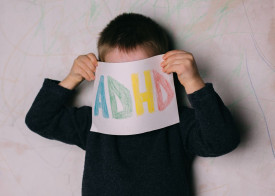Maria Beard
- June 07, 2023
Hypermobility. If you live with it, you know the unique challenges it brings: joint pain, fatigue, and difficulties in performing day-to-day tasks that many take for granted. This blog post aims to guide you through the world of hypermobility and highlight some of our products that can make life a little easier. Whether you're younger or older, suffering from hypermobility or arthritis, or caring for someone who does, there are tools and gadgets designed to help you navigate life with more comfort and control.
What is hypermobility?
Let's start with a brief overview of hypermobility. In the simplest terms, hypermobility refers to the ability of certain joints to move beyond the typical range of motion. This condition affects many people across all ages and can bring about both physical and emotional challenges.
- May 17, 2023
As a parent, you're always going to have moments when you worry about your child's behaviour. It's natural to feel anxious, clueless, or concerned, especially if your child seems to be struggling with attention and hyperactivity. If you suspect your child may have Attention Deficit Hyperactivity Disorder (ADHD), you're not alone. Many parents share your concerns, and as someone who has walked this path before, I can assure you that there is hope and help available.
In this blog, we'll cover general information about ADHD, the signs and symptoms to look out for, and the process of diagnosis and support in the UK.What is ADHD?
- April 28, 2023
As people become more aware of various learning difficulties and disabilities, and making our content accessible to everyone is super important. We believe there's no reason not to cater to all, and that means thinking about things like choice of font and branding, which can really impact how easy it is to read for folks with dyslexia. That's why we'd like to share with you why we've decided to use the dyslexia-friendly font Lexend for our content, striking a balance between professionalism and inclusivity.
Accessibility – why it matters
Accessibility is all about making sure products, devices, services, or spaces work for people with disabilities or learning
- April 14, 2023
At Tink’n’Stink, we understand the struggles that come with sensory processing issues. Fidget toys are a great way to relieve stress and anxiety and to help focus on tasks. But, there is a growing concern over the safety of cheap, unbranded fidget toys. We think it’s important to recognise and explore the dangers of these toys and understand why it's always better to invest in a branded fidget toy.
Safety regulations
The biggest concern with unbranded fidget toys is the lack of safety regulations. These toys are often manufactured without any testing or quality control standards,
- March 31, 2023
The Resolution Foundation's recent research highlights that there has been a rise of 2.3 million disabled people in employment, with around 1 in 7 workers being disabled. If you have a physical or mental health problem, or if you are disabled, Access to Work may be able to assist you in finding or retaining a job.
The level of support you receive will be based on your requirements. Through Access to Work, you may apply for a grant to help pay for practical work support, assist in managing your mental health at work, and more. - March 28, 2023
As an autism advocate and provider of autism-friendly toys and learning aids, I know how important it is for families with neurodivergent children to choose the right holiday destination. Holidays can be overwhelming and overstimulating for those with sensory processing difficulties, so it's crucial to choose a destination that caters to their needs.
If you're a parent of an autistic child, you may have already experienced the difficulties of finding an autism-friendly holiday - February 21, 2023
Trichotillomania, commonly abbreviated as TTM, is a mental health disorder that causes a person to pull out the hair on their head, eyebrows, eyelashes, beard, or anywhere else on the body with hair growth. This urge is often triggered by stress, anxiety, a chemical imbalance in the brain similar to obsessive-
- February 10, 2023
Choosing a school or further education centre for any child can be an anxiety inducing experience for any parent or carer. Finding a suitable school, college, or university for a child or young adult with SEN or disabilities can be even more difficult. With more to consider, this exciting key stage in your child or teenagers' lives can feel like a real challenge. In today’s blog, we’re going to be discussing some factors to help make the process, choice, and transition into education a much smoother process.
Identify your child’s needs
If your child already has an education, health and care plan (EHC), or a SEN support plan, then their previous school should be able to offer you support in finding another school or further education centre. These documents will also include a list of requirements for your child,
- January 24, 2023Autism in girls presents itself in different ways from boys, resulting in some girls receiving a diagnosis much later in life. This can result in issues such as low self-esteem, depression, and a lack of necessary support.
- January 01, 2023Biting is a normal behaviour for younger children and is a sign of their developing mouths and teeth. It’s also a way for children to explore and understand the world around them. However, excessive chewing after the toddler years can be a sign of an underlying issue and can be harmful to both the child and the objects they are chewing on.




